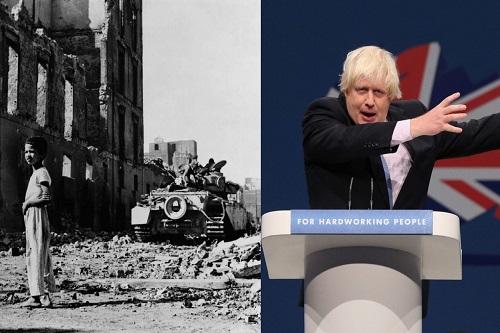AFP photo
By
Rupen Savoulian
The Suez crisis marked the end of an empire, but the lessons of that historic episode remain to be understood.
When you are born in Australia from a non-English speaking background, the inevitable inquiry you face is ‘where do you come from?’ That is not necessarily asked in a hostile way, but is usually motivated by curiosity. The short answer to that question is ‘from Egypt’. That much is true – though to be specific, I am Egyptian-Armenian; both my parents were born in Egypt of Armenian ancestry. The specificity of this ethnic background is sometimes too complicated, or a case of information-overload, for Australians of Anglo-Celtic extraction (no offence), so I normally stick to the short version.
When asked this question in a social setting, or at the workplace, I know what is coming after I answer it. Having said that my background is Egyptian, I now must prepare myself – because I have just become the unwitting and unofficial ambassador for Egypt and for everything Egyptian. I am now the portable Google to answer questions about that country. Once again, none of this is motivated by hostility, but by well-meaning and earnest curiosity. The people around me now have an accessible guide with whom to share their Hollywood-inspired notions and questions about Egypt.
I have, unintentionally, assumed the totemic identity of everything Egyptian. Usually, the topics that people ask me about involve the following list:
The pyramids, Tutankhamun, mummies, riding camels, and kebabs. Egypt is a land of mysterious curse-afflicted archaeological structures, exotic Middle Eastern foods and freaky, fanatical Muslims.
Do not misconstrue my argument – ancient Egypt and its archaeology is an endlessly fascinating subject. The tensions between politics and religion are always playing out in various ways and in different public arenas in Egypt – while that nation is officially secular, there are groups such as the Muslim Brotherhood, who wish to base the entire structure of public and political life on a strictly religious basis. Actually, the state has come to dominate the main religious institutions in the nation, so religion is a major source of legislation.
Be that as it may, there are lessons to learn from the history and politics of Egypt. There are major implications for our political and economic system today – implications that remain ignored by our political and financial elites. I have been remiss in my job as unofficial ambassador for Egypt – but I hope to make amends today. October 2016 marked 60 years since the start of the Suez crisis – an episode that remains little understood. This operation, known as the Tripartite Aggression in Egypt, was the military response of the imperialist states (namely Britain and France, along with their ally Israel) to the nationalisation of the Suez canal undertaken by former Egyptian President Gamal Abdel Nasser.
The British authorities are never shy about commemorating their foreign wars – the Falklands, the D-Day landings, Waterloo, Trafalgar, the current deployment to Iraq – each has their own commemorative activities, statues, services of remembrance, unveiled plaques, parades, recitals of the British military divisions that served, and so on. However, Suez remains the forgotten war, its details and lessons consigned to oblivion. Perhaps this is because the Suez war was the end of imperial empire; the unmistakable evidence that while Britannia may have ruled the waves, its maritime supremacy came crashing down at the Suez canal.
****************
The Suez Canal itself, built in 1869 and financed by Britain and France, had always been of strategic interest to the imperialist powers. In 1956, the nationalist government of President Nasser nationalised the company that controlled the Suez canal’s maritime traffic. This move, enacted in July 1956, was a direct blow to the interests of the former colonial power in Egypt, Britain. The latter had looked with apprehension at the rise of the nationalist (and anti-Communist) regime of the Free Officers led by Nasser.
Not only did Nasser challenge the British empire, but was also posing a threat to the imperialist system. Britain in the immediate post-World War Two era was an empire in decline. A wave of decolonisation had swept over Britain’s former colonies. Nasser’s move to nationalise the Suez Canal was a major impetus for anti-colonial and anti-imperialist struggles in other African and Asian countries.
The Prime Minister of Britain at the time, Anthony Eden, became obsessed with getting rid of Nasser, going so far as to demand the latter’s assassination. Britain, along with its partner France, began a criminal conspiracy to reverse the Suez canal nationalisation and achieve regime change in Egypt. That meant an intensive military operation to overthrow the fledgling Egyptian regime.
Eden presented his conflict with Nasser in existential terms – denouncing Nasser as the ‘new Hitler’. Eden portrayed the Egyptian regime as having the power of blackmail over the British empire – after all, the Suez canal was a ‘chokehold’ point for maritime traffic. The British government, disguising its imperialist imperatives in humanitarian garb, tried to present military intervention as a peacekeeping operation. Invoking the Hitler analogy so soon after the conclusion of the Second World War, Eden was setting a template for ‘humanitarian intervention’; a template of propagandistic deception for imperialist economic and military interests. Eden deliberately misled the public and the international community regarding the extent of collusion with France and Israel to grab the Suez Canal.
Israel invaded first, in order to seize the Sinai peninsula. France, facing an Arab nationalist revolt in its colony of Algeria, intended to send a message to its Algerian opponents that no challenge by Arab nationalism would be tolerated. French collaboration in this war was obvious – French warplanes flew from Israeli airfields to attack Egyptian territory. Britain, always circumspect, invaded the Suez region in early November 1956, and added to its already blood-soaked history of empire-building.
The Egyptians resisted fiercely; the move to nationalise the Canal had popular support. Nasser had stated, when pursuing the nationalisation, that: “Everything which was stolen from us by that imperialist company, that state within a state, when we were dying of hunger, we are going to take back. In the name of the nation, the president of the republic declares the International Suez Canal Company an Egyptian limited company.”
Former US President Dwight Eisenhower, already worried by the apparent drift of Arab countries into the Soviet orbit, ordered that all British, French and Israeli troops withdraw from the Canal zone and the Sinai. Eisenhower, anxious to disassociate America from traditional European colonialism, sought a peaceful resolution of the conflict. Publicly censuring his wartime allies, as well as Israel, the Tripartite aggression was militarily a success, but politically a failure. The Eden government, forced to withdraw its troops, backed down in a humiliating retreat. Eden resigned in early 1957. Ironically, Eisenhower threatened to cut off Britain’s oil supplies if London did not agree to this resolution – the American president and ally of Britain exercised the ‘stranglehold’ on oil which Eden accused Nasser of wielding.
The sun had finally set on the British empire.
What has all this got to do with today’s events?
Sixty years after Suez, Whitehall needs to learn the lessons of that conflict. Reviving the empire, Mark 2.0, is not a vision for the future. The question of Brexit – a question that hangs over British politics until today – has been conducted as an exercise in imperial nostalgia. When English politicians, such as current Foreign Secretary Boris Johnson, speak of the British empire in glowing terms, they are failing to face up to the toxic legacy of that empire, embodied by the defeat in Suez. Not only does Tory Brexit ignore a brutal history, as Kenhinde Andrews suggests in an article for The Guardian. Colonial nostalgia and whitewashing the empire’s crimes are no foundations for a renewed future. Post-Brexit Britain cannot build a new society based on a myth of empire – a mythologised past that dangerously obscures the criminal nature of imperialist empire-building.
David Olusoga, writing in his article “Empire 2.0 is dangerous nostalgia for something that never existed” writes that today’s British government of Theresa May cannot rectify Britain’s problems by gambling on an Anglophone vision of reviving the Commonwealth as a trading and military bloc. He writes that:
The empire, even at its height, never came close to absorbing the majority of our exports or providing the bulk of our imports, and neither will the Commonwealth, no matter how good a trade deal we win. Empire 2.0 is a fanciful vision of the future based on a distorted misremembering of the past. It’s a delusion and, like all delusions, has the potential to lure us into a false sense of security and lead us to make bad decisions.
The song ‘Rule Britannia’ contains the lyrics “Rule, Britannia! Rule the waves. Britons never will be slaves.” That is true, because Britain spent decades enslaving and colonising others, and attempted to present that conquest as an exercise in humanitarian intervention. The Suez crisis, not only demonstrated that empire-building had come to an end, but that hankering for a mythical imperial past is a dangerous delusion upon which to build a future. London should stop regarding its former empire as an exercise in humane nation-building and democracy promotion.
Since 1956, the British political establishment has accepted a role as junior partner of American imperialism – just like Australia’s obsequious deference to the United States. It is high time for the white sisters to rethink their slavish and cynically-calculated affiliations.
Rupen Savoulian
I am an activist, writer, socialist and IT professional. Born to Egyptian-Armenian parents in Sydney, Australia, my interests include social justice, anti-racism, economic equality and human rights.



The song ‘Rule Britannia’ contains the lyrics “Rule, Britannia! Rule the waves. Britons never will be slaves.” <<=== where is link to hear the song.. :} by the way nice post...